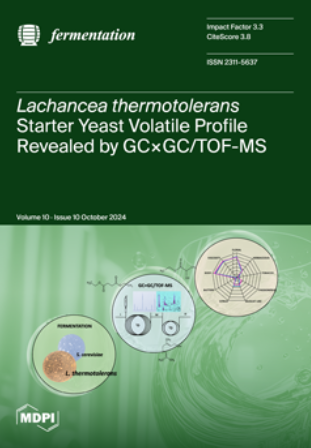Characterization of a Metallic-Ions-Independent L-Arabinose Isomerase from Endophytic Bacillus amyloliquefaciens for Production of D-Tagatose as a Functional Sweetener
IF 3.3
3区 农林科学
Q2 BIOTECHNOLOGY & APPLIED MICROBIOLOGY
引用次数: 0
Abstract
D-Tagatose is a low-calorie sugar substitute that has gained increased attention as a functional sweetener owing to its nutraceutical and prebiotic properties. Traditionally, D-tagatose is produced via the enzymatic conversion of L-galactose to D-tagatose by L-arabinose isomerase (L-AI). Nonetheless, the most reported L-AI enzymes are ion-dependent enzymes requiring Mn2+ and/or Co2+ as cofactors for their reactions, which limits their application due to safety and health concerns. Herein, we addressed the facile bioconversion of L-galactose to D-tagatose using a novel recombinant metallic-ions-independent L-AI derived from endophytic Bacillus amyloliquefaciens CAAI isolated from cantaloupe fruits. The ORF (1500 bp) of the L-arabinose isomerase gene (araA) was cloned and over-expressed in Escherichia coli. The recombinant enzyme (BAAI) was purified to homogeneity using Ni-NTA affinity chromatography, yielding a single distinct band with an apparent molecular mass of approximately 59 kDa as deduced from SDS-PAGE analysis. The purified enzyme showed optimum activity at pH and temperature of 7.5 and 45 °C, respectively, with obvious enzymatic activity in the presence of ethylenediaminetetraacetic acid (EDTA), indicating the metallic-ions independence from BAAI. The Km values of BAAI for D-galactose and L-arabinose were 251.6 mM and 92.8 mM, respectively. The catalytic efficiency (kcat/Km) values for D-galactose and L-arabinose were found to be 2.34 and 46.85 mM–1 min–1, respectively. The results revealed the production of 47.2 g/L D-tagatose from D-galactose (100 g/L) with 47.2% bioconversion efficiency in a metallic-ions-free reaction system that could be implemented in safe-production of food-grade low-calorie sweetener, D-tagatose.内生解淀粉芽孢杆菌中一种不依赖金属离子的L-阿拉伯糖异构酶的特性研究
塔格糖是一种低热量的糖替代品,由于其营养和益生元特性,作为一种功能性甜味剂受到越来越多的关注。传统上,d -塔格糖是通过l -阿拉伯糖异构酶(L-AI)将l -半乳糖转化为d -塔格糖生产的。尽管如此,大多数报道的L-AI酶是离子依赖性酶,需要Mn2+和/或Co2+作为其反应的辅助因子,这限制了它们的应用,因为安全和健康问题。本研究利用从哈密瓜果实中分离出来的解淀粉内生芽孢杆菌(Bacillus amyloliquefaciens CAAI)中提取的新型重组金属离子不依赖的L-AI,研究了l -半乳糖向d -塔格糖的生物转化。克隆了l -阿拉伯糖异构酶基因(araA)的ORF (1500 bp),并在大肠杆菌中过表达。重组酶(BAAI)通过Ni-NTA亲和层析纯化到均匀性,SDS-PAGE分析得到一个明显的条带,表观分子质量约为59 kDa。纯化后的酶在pH为7.5℃、温度为45℃时活性最佳,在乙二胺四乙酸(EDTA)存在时酶活性明显,表明BAAI的金属离子不依赖于BAAI。d -半乳糖和l -阿拉伯糖BAAI的Km值分别为251.6 mM和92.8 mM。d -半乳糖和l -阿拉伯糖的催化效率(kcat/Km)分别为2.34和46.85 mM-1 min-1。结果表明,在无金属离子反应体系中,从100 g/L的d-半乳糖生产47.2 g/L的d-塔格糖,生物转化率为47.2%,可用于安全生产食品级低热量甜味剂d-塔格糖。
本文章由计算机程序翻译,如有差异,请以英文原文为准。
求助全文
约1分钟内获得全文
求助全文
来源期刊

Fermentation-Basel
BIOTECHNOLOGY & APPLIED MICROBIOLOGY-
CiteScore
3.80
自引率
18.90%
发文量
594
审稿时长
7 weeks
期刊介绍:
Fermentation-Basel is an international open access journal published by MDPI, focusing on fermentation-related research, including new and emerging products, processes and technologies, such as biopharmaceuticals and biotech drugs. The journal enjoys a good reputation in the academic community and provides a high-impact forum for researchers in the field of bioengineering and applied microbiology.
 求助内容:
求助内容: 应助结果提醒方式:
应助结果提醒方式:


